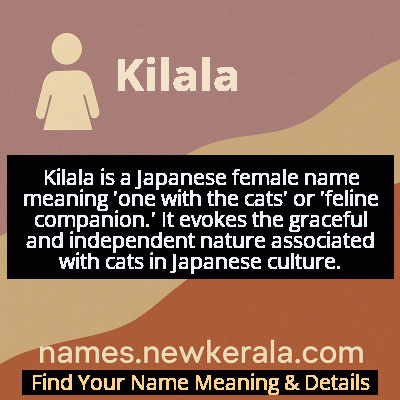Kilala Name Meaning & Details
Origin, Popularity, Numerology Analysis & Name Meaning of Kilala
Discover the origin, meaning, and cultural significance of the name KILALA. Delve into its historical roots and explore the lasting impact it has had on communities and traditions.
Name
Kilala
Gender
Female
Origin
Japanese
Lucky Number
1
Meaning of the Name - Kilala
Kilala is a Japanese female name meaning 'one with the cats' or 'feline companion.' It evokes the graceful and independent nature associated with cats in Japanese culture.
Kilala - Complete Numerology Analysis
Your Numerology Number
Based on Pythagorean Numerology System
Ruling Planet
Sun
Positive Nature
Leaders, ambitious, highly driven, self-reliant, innovative.
Negative Traits
Overly aggressive, domineering, impatient, selfish.
Lucky Colours
Red, orange, gold.
Lucky Days
Sunday.
Lucky Stones
Ruby, garnet.
Harmony Numbers
2, 3, 9.
Best Suited Professions
Entrepreneurs, managers, engineers.
What People Like About You
Courage, determination, leadership.
Famous People Named Kilala
Kilala Reno
Fictional Character
Main protagonist in 'Kilala Princess' manga series
Kilala Hoshino
Voice Actress
Known for anime roles featuring animal companions
Kilala Takahashi
Artist
Illustrator specializing in cat-themed artwork
Name Variations & International Equivalents
Click on blue names to explore their detailed meanings. Gray names with will be available soon.
Cultural & Historical Significance
The name gained particular popularity through manga and anime culture, where characters named Kilala often embody traits of grace, independence, and magical connection to animals. This reflects Japan's contemporary blending of traditional beliefs with modern pop culture, creating names that honor ancient symbolism while appealing to younger generations. The name's structure follows Japanese phonetic patterns while incorporating soft, melodic sounds that evoke the gentle nature associated with cats.
Extended Personality Analysis
Individuals named Kilala are typically perceived as graceful, independent, and intuitive, much like the feline companions their name references. They often possess a natural elegance and poise in their movements and interactions, combined with a strong sense of self-reliance. Kilalas tend to be observant and perceptive, noticing details others might miss, and they value their personal space and freedom while maintaining warm connections with those they trust.
Their personality often includes a playful, curious side that emerges in comfortable environments, along with a protective nature toward loved ones. Kilalas are known for their adaptability and ability to land on their feet in challenging situations, demonstrating resilience and quick thinking. They typically form deep, loyal bonds with a select few rather than seeking widespread social circles, and they possess an innate understanding of when to offer comfort and when to respect boundaries.
Modern Usage & Popularity
Kilala remains a relatively uncommon but recognized name in modern Japan, primarily used by parents who appreciate its melodic sound and feline associations. The name saw a slight surge in popularity during the early 2000s following the release of 'Kilala Princess' manga series, particularly among families with interests in anime and manga culture. While not ranking among the top names in Japan, it maintains a niche appeal for parents seeking unique names with gentle, animal-inspired meanings. The name is occasionally used in Japanese diaspora communities abroad, where it serves as a cultural touchstone while being accessible to non-Japanese speakers.
Symbolic & Spiritual Meanings
Symbolically, Kilala represents the harmonious relationship between humans and nature, specifically the mystical connection with feline creatures. The name embodies qualities of independence balanced with loyalty, grace under pressure, and intuitive wisdom. In broader symbolic terms, it suggests someone who moves through life with quiet confidence, possesses hidden strengths, and maintains an air of mystery while being deeply connected to their instincts and emotions. The name also carries connotations of protection, good fortune, and spiritual awareness, drawing from the traditional Japanese belief in cats as guardians and bringers of luck.

